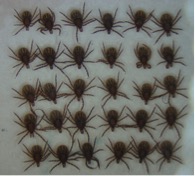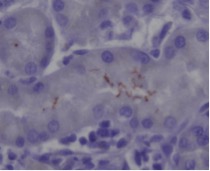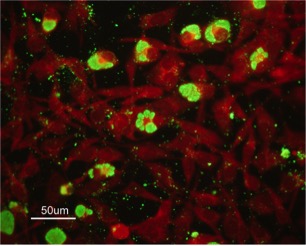Worldwide recent research has highlighted the worrying levels of anthelmintic resistance (AR) in gastrointestinal nematodes of farm animals. Our research centres on the understanding of AR in animals in Ireland and to provide guidance to farmers on how best to manage AR on farms through appropriate management practices and targeted selective treatments.
Veterinary Pathobiology
The Veterinary Pathobiology section incorporates Parasitology, Microbiology with Virology and Pathology. Below are some examples of the variety of research that is conducted within this section.
Please click here to access staff profiles for the UCD Veterinary Pathobiology Section.
Parasitology
Another group works to understand the biology of helminth infection, and how it influences both the immune system and gut microbiome of the host. The work involves parasites of importance in domestic animals (liver fluke, and redworms of horses), and we strive for impact in the development of vaccines, diagnostics and insights relevant across the One Health spectrum.
 Other research focuses on various parasites of medical and veterinary importance, and through close working relationships with clinical colleagues in the School we have been able to investigate the link between the (molecular) epidemiology of many of these parasites and their clinical importance in Ireland. Another long-term research focus has been the ecology and epidemiology of ticks and tick-borne diseases and host-parasite interactions.
Other research focuses on various parasites of medical and veterinary importance, and through close working relationships with clinical colleagues in the School we have been able to investigate the link between the (molecular) epidemiology of many of these parasites and their clinical importance in Ireland. Another long-term research focus has been the ecology and epidemiology of ticks and tick-borne diseases and host-parasite interactions.
Pathology
Current related projects include the ‘lesion profiling’ of various categories of cattle reacting to the intra-dermal tuberculin test in Ireland in collaboration with The Department of Agriculture, Food and the Marine (DAFM). Studies on tuberculosis also focus on murine models of the disease in humans for vaccine development in collaboration with the Statens Serum Institute, Copenhagen, Denmark and new treatment drug development in collaboration with The School of Pharmacy at The Royal College of Surgeons in Ireland.
Current research projects include a ‘One Health’ approach to the pathogenesis of canine demodicosis and rosacea and monitoring triple negative breast cancer treatment response and disease progression in human and feline patients.
 Current research projects focus on the development of robust diagnostic techniques for the detection of Leptospira sp. in wildlife and domestic animals. These are used, for example, to study a novel Leptospira sp. in the greater-white tooth shrew, an invasive species to Ireland, and investigate ovine abortion caused by Leptopsira sp.
Current research projects focus on the development of robust diagnostic techniques for the detection of Leptospira sp. in wildlife and domestic animals. These are used, for example, to study a novel Leptospira sp. in the greater-white tooth shrew, an invasive species to Ireland, and investigate ovine abortion caused by Leptopsira sp.
Image: Pathogenenic Leptospira present in renal tubules of a Squirrel monkey, IHC using Lip32 antibody
Current projects and publications are:
- High-content screening for predicting and mechanistic-understanding of vivo toxicity
- High-sensitivity, cardiac troponin for assessmet of active, myocardial injury
- Pancreatic-specific lipase
- Glutamate dehydrogenase
- Tissue pathobiochemistry
- Diagnostic, digital cytopathology in oncology
(opens in a new window)https://people.ucd.ie/peter.james.obrien
Microbiology
 Current research includes the development of recombinant protein vaccines for the protection of pregnant ewes from enzootic abortion of ewes (EAE) and the evaluation of diagnostic assays for the detection of Mycobacterium avium subsp. paratuberculosis (MAP) infection and their application in the national voluntary control scheme for Johne’s disease.
Current research includes the development of recombinant protein vaccines for the protection of pregnant ewes from enzootic abortion of ewes (EAE) and the evaluation of diagnostic assays for the detection of Mycobacterium avium subsp. paratuberculosis (MAP) infection and their application in the national voluntary control scheme for Johne’s disease.
Image: Fluorescent antibody stained, intracytoplaqsmic inclusions of chalmydiae (green) in cell culture (red)
Antimicrobial resistance is the major ‘One Health’ issue of our times and current projects focus on overuse of antimicrobials in the intensive pig and poultry industries.
Other research involves epidemiology and control of Salmonella infection in pigs, Staphylococcus aureus mastitis in dairy cows and infection control in veterinary hospitals.
The Mycobacterium tuberculosis complex encompasses the aetiological agents of tuberculosis in mammals. The current focus is on the exploitation of the genome sequence of human pathogen, Mycobacterium tuberculosis, and the bovine pathogen, Mycobacterium bovis, to accelerate vaccine and diagnostic development. Further, improved diagnostics for Johne's disease in cattle, caused by Mycobacterium avium subsp paratuberculosis, are being explored.
The research focus is on understanding the species barrier and how the information on its molecular basis can be used to develop new more effective therapies for the treatment of virus infections.